It's all going so well, isn't it. Carry on like this and we'll break all the records, surpassing even 1956/57 and 2013/14, those other seasons when we cruised to promotion. But don't be surprised if it isn't quite that simple. For Leicester, promotion seasons are often less of a cruise, more of a rollercoaster.
Martin O'Neill has never forgotten the darkest hour of his promotion season, March 30th 1996 . 'The crowd became very restive', he quipped recently, 'in fact, more than restive - they were downright unaccommodating. It's a tale you're no doubt familiar with.
There's a similar story a bit further back in history. January 22nd 1983 - a date Gordon Milne has probably never forgotten. Given the circumstances, his eventual triumph was even more impressive than O'Neill's. But this is a story no-one knows - at least, not in any detail. Because it's never been told before.
Time to put that right.
Not My Gaffer
Gordon Milne arrived in August 1982 after Jock Wallace suddenly quit, accepting a lucrative offer from Motherwell. Wallace's departure was a real shock - for the fans, who loved him, for the players, who would run through brick walls for him, and for the board of directors, who'd offered him an unprecedented seven year contract (only two years of which had been completed).
The contrast with Wallace handicapped Milne from the start. No City manager had ever had the rapport with the fans that Big Jock enjoyed. The team played with the 'battle fever' mentality he demanded - none more so than his fellow Scot at centre forward, celebrated in song on the Kop: 'He's here, he's there, he's every ***king-where, Alan Young, Alan Young!. And that could equally apply to Wallace himself - his personality was stamped over every corner of the club, on and off the field.
Milne's style was very different. The fans took time to get to know him - and many weren't sure they liked what they saw when they did. Just like Jock, the way Milne's team played reflected his personality. Less direct, more patient, more thoughtful. After the Wallace years, many found the change hard to accept. It was just like Martin O'Neill in 1995/96, with fans pining for Mark McGhee, though in that case it was precisely the opposite form of nostalgia, with O'Neill's direct style seeming like a backwards step after McGhee's possession-based approach.
Another problem for Milne was his CV. He'd spent the previous ten years at Coventry City. Fans were wary of a man so steeped in Sky Blue - and that was before the season started.
When the action began, all these points came together in a perfect storm.
First, Jock Wallace's key men departed. When you've been playing for a manager you respect so much, it can feel like a betrayal to suddenly switch your loyalties. Alan Young left for Sheffield United, saying he simply 'couldn't accept Milne as gaffer' (similar again to 95/96, when Steve Corica told Martin O'Neill that he wanted to go to Wolves because of how much he 'respected Mr. McGhee'.
Next to quit was Jim Melrose, Wallace's other big money signing. This was the moment when things really started going wrong, so let's look at what happened in some detail:
Melrose and English
City were lying ninth in Division Two on September 14th when it happened. This was the Coventry Evening Telegraph that day:
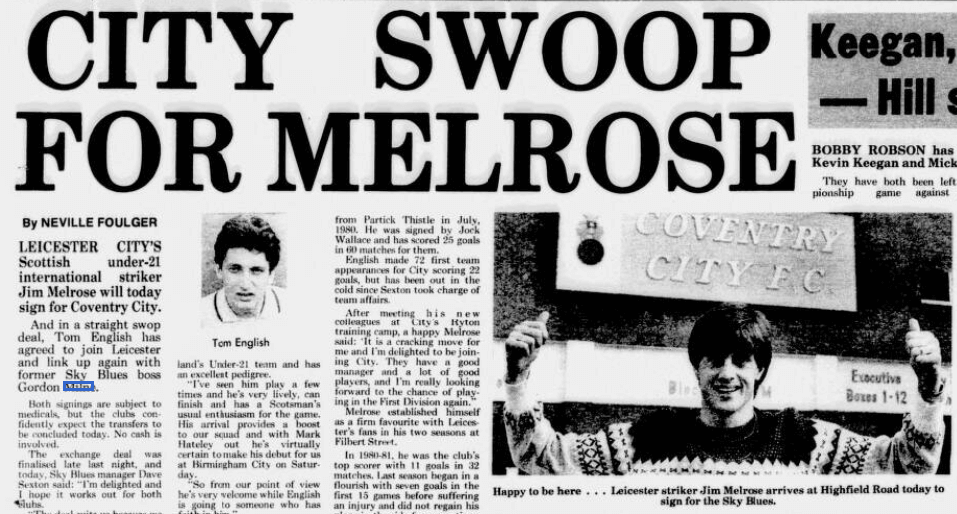
And this was the Mercury the same day:
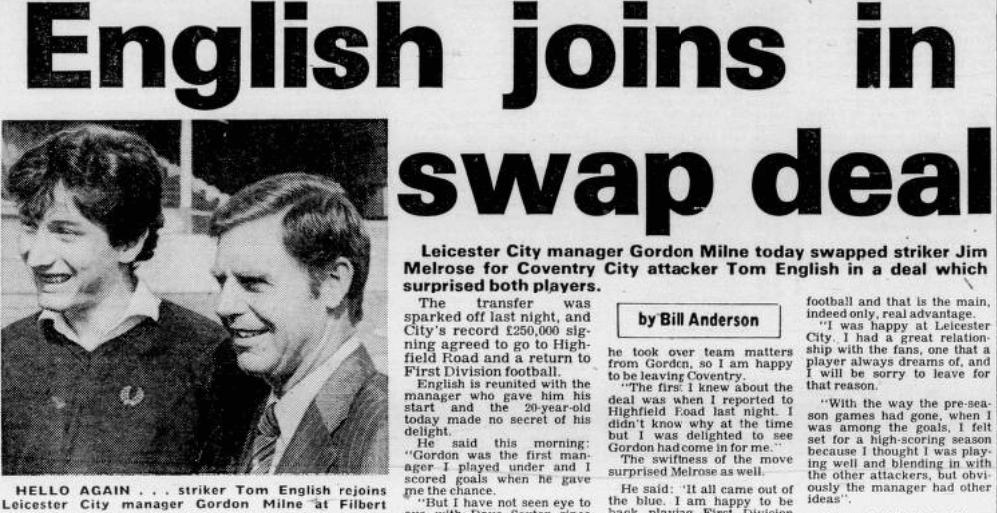
Yes - an M69 swap. Melrose, hugely popular at Filbert Street, exchanged for Tommy English, a man whose relationship with Coventry fans could not be described in similar terms. Leicester fans suspected they'd got the worst of the deal, but Milne said everything would be OK. He promised that English, the man he'd developed at Highfield Road, would score more goals than Melrose.
Let's see how that went.
Melrose had a sensational home debut for Coventry, scoring a hattrick against Everton. Leicester were at home to QPR that day, with English in the side. We lost 1-0 - already our third home defeat of the season. News of the hattrick spread round the terraces, and the chant began: 'One Jim Melrose! There's only one Jim Melrose! One Jim Melrose! There's only one Jim Melrose!'
Milne must have loved that. And if that wasn't enough, the next roar from Pen 3 was: 'Jock Wall - ace! Jock Wall - ace!'.
The following week, Melrose scored again at Maine Road, while English was yet to get off the mark. That was followed four days later by a Melrose double in the League Cup at Fulham, while we were losing 2-0 at Lincoln City.
The Coventry Evening Telegraph again:
So the score so far was Melrose 6 English 0. 'The worst fears of Leicester City fans over the Melrose-English swap are starting to come true', said the report. Melrose then decided to put the boot in: 'Gordon Milne must wince every time he reads the papers these days', he said.
Two weeks later, Milne signed Jimmy Holmes on loan. He was another ex-Coventry man. He made his debut at left back in a 2-0 home defeat to Sheffield Wednesday. The following week, it was Holmes' disastrous back pass that led to Cambridge United's clincher in a 3-1 win at Abbey Stadium. That was the last we saw of Jimmy Holmes - he never played for us again.
In early December, the team of the season (so far) arrived at Filbert Street - Fulham, managed by 'Supermac' - Malcolm Macdonald. They were second, behind QPR, and if they won their game in hand they'd go top. We were way down in 15th place. The idea that we could finish the season above them would have seemed ludicrously fanciful.
Fulham were playing great football, never more so than in a devastating 4-1 win at St. James Park, a very special day for old Geordie hero Macdonald.
Watch the first 90 seconds of this video and see how impressively they tear Newcastle to shreds in the first half with a three goal burst:
Macdonald was only 32. He'd had to quit the game early due to injury, but now he was back in the limelight. The day before the game at Filbert Street, he signed a lucrative deal to write a weekly column for the Daily Mirror:
Looks pretty confident, doesn't he? With Fulham flying high, perhaps it was justified. But the season wasn't even half over yet.
The game at Filbert Street was still goalless with time running out when our season was rescued - by a divot.
A header from Alan Smith was about to be collected comfortably on the bounce by Fulham keeper Gerry Peyton. But the ball didn't bounce. It hit a divot and shot forward, rebounding off Peyton's shins to give David Buchanan the chance to put City ahead. 'The ball hit a hole and shot along the ground', Macdonald lamented afterwards. We then added another and Fulham's great run was over.
You can see that divot here - just to the right of Peyton:
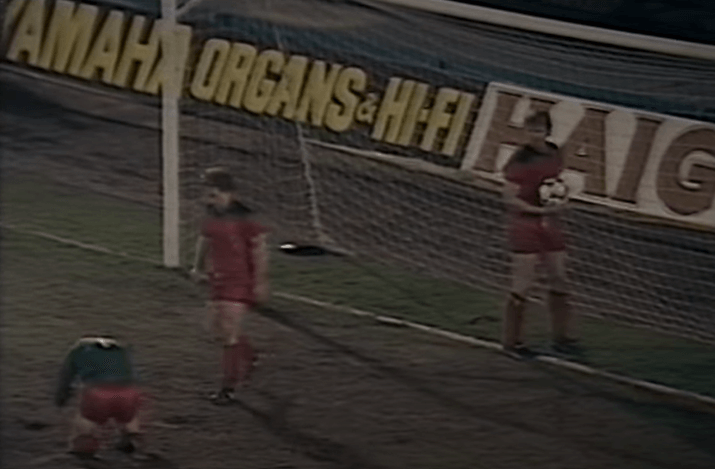
And you can see the goal here:
Our second goal that day was scored by Gary Lineker. With Young and Melrose gone, he was developing a new striking partnership with Alan Smith, Wallace's last signing. Lineker had actually been dropped after a lack lustre performance in Milne's very first game (another home defeat - to Charlton), but he was now hitting form.
We followed up that Fulham win with two more, and there was talk of us getting back in the promotion race.
But then came January, and the darkest hours of Milne's reign at Leicester. To introduce what happened, let's take a short detour - on to the motorway that lies at the heart of this whole story:
The M69
Gordon Milne could be forgiven for thinking that the M69 had been planned and constructed entirely for his own personal convenience. When he became Coventry manager in 1972, he had a house built in Burbage, midway between Coventry and Leicester, and when the Sky Blues weren't playing he loved to watch games at Filbert Street, long before he took over as our boss. His route would take him along the A46 - part of the old Fosse Way. Milne was no doubt aware of the link to the origins of the club.
In 1976, that journey was made easier when the first section of the M69 was opened - rolled out like a red carpet between the M1 and Burbage, very close to his house. Six months later, the second section opened - from Burbage to Ansty near Coventry - and his daily commute was now so much more straight forward.
When he joined Leicester he joked that a 13 mile trip one way had now become a 13 mile trip in the opposite direction.
That brings us to events late at night on Thursday, January 5th, 1983.
As is so often the case when calamity strikes, you can only fully understand what happened by looking at a whole chain of events.
This particular sequence started eight months earlier - at the biggest game of Jock Wallace's time at Leicester, the FA Cup Semi-Final against Spurs at Villa Park. Everything went wrong that day - players off form, Ian Wilson's own goal, and not least, Tommy Williams breaking his right leg in a challenge with Tony Galvin.
It wasn't until December, just after that Fulham game, that Williams was ready to return to first team action. But then tragedy struck again. On the morning of January 6th during a routine training session, Williams was tackled by Dave Buchanan, and broke the same leg again. Buchanan's challenge was described as 'run-of-the-mill'. The injury was apparently a freak accident. But that was little consolation for Williams. He'd played just four games since coming back, and now it looked like his season was over.
'It's a terrible blow', said Milne, 'I'm so sorry for the lad'.
Milne decided to offer more than just words of consolation. That evening, along with Commercial Manager Peter Hill, he drove round to Williams' house with a bottle of champagne. The three shared the bottle between them, after which Milne headed down the M69 to his Burbage home.
It was a freezing night, and around midnight, about four miles from home, Milne lost control of his Mercedes on the icy surface and skidded onto the embankment, the car striking a marker post and coming to rest in the snow.
Milne got out of the car and a passing motorist, a Mr. Wilf Goss, stopped to assist him, giving him a lift the short journey home to Burbage.
Shortly afterwards, a police motorway control car passed the scene of the crash. PC Peter Jefferies, on finding the abandoned Mercedes, checked the number plate and phoned though to the national computer centre, who told him the owner's details. Jefferies then drove to Milne's Burbage address.
Milne at first denied that he'd been driving the car, and wouldn't say who had been. He refused to take a breathalyser test. PC Jefferies tried to arrest him, but Milne resisted, at which point Jefferies called for support. After what reports described as 'a struggle', Milne was placed in a police car and taken back down the M69 to Wigston Police Station, passing his abandoned Mercedes on the opposite carriageway along the way. At Wigston he gave a sample which revealed 182 milligrams of alcohol in 100 ml of blood - more than twice the legal limit of 80mg.
It's unclear what time he got home that night, or how he got into work the next morning. But when he did arrive he had a big decision to make. Who would replace Williams at left back in the FA Cup tie at home to Notts County the following day? Paul Friar was the obvious choice, having already played in 20 games that season, but Milne sprang a surprise by giving a debut to 18 year old Paul Brown.
When the game started, County raced into a three goal lead, and two very late goals in reply couldn't disguise the reality of an easy win for the Magpies. He couldn't be singled out for blame any more than his teammates, but Brown never played for the club again.
We could now concentrate on the League. But the following week we lost at Charlton, and it looked like the season was already over.
Was Milne regretting his move to Leicester? He had been in the job six months. From his own fans there was suspicion, verging on hostility. From ex-players there was rejection (Young) and ridicule (Melrose). And from the law there now came a summons to appear before Hinckley magistrates. The threat of a conviction for drink driving would hang over the remainder of the season.
And that wasn't all. Perhaps the biggest obstacle Milne had to overcome that season was financial. While other Division Two clubs made extravagant signings (witness the extraordinary arrival of two recent European Footballer of the Year Winners - Kevin Keegan at Newcastle and Allan Simonsen at Charlton), Leicester City didn't have two pennies to rub together. When he took over, the board made the situation plain. There was no money to spend, and even if he sold players, the proceeds would go towards running costs. His main task, he was told, was to address 'the gross over-staffing at the club'. He had to make drastic cuts to the squad.
Drastic cuts. Two words that sum up the economy of the UK in the early 80s. Drastic cuts that led to a deep recession, and soaring unemployment. The new figures had just been released - an unbelievable 3.1 million people were now out of work.
Throughout January, the BBC was showing the Alan Bleasdale drama 'Boys From The Blackstuff', which told of the impact of unemployment on the people of Liverpool - including Yosser 'Giz a Job' Hughes. But it wasn't just in the north that unemployment was devastating communities. In mid-January, right here in M69 country, the anger was plain to see. And it was here that the two narratives converged, political controversy providing an illuminating counterpoint to events at Filbert Street.
It was two days before the Leicester v Blackburn game, the low point of the season. Employment Secretary Norman Tebbit, 'Thatcher's skinhead' as some called him, was visiting the Jaguar car plant in Coventry. That was the plan anyway. When news of his visit spread, the entire workforce of 3,000 threatened to come out on strike if Tebbit set foot inside the building. Union leader Bob Ainsworth said, 'Nearly everyone here has a friend or relative who has been put on the dole by Tory policies'. Tebbit was forced to change his plans.
The following day, Friday, Tebbit headed up the motorway to Leicester. He visited an IT centre at the Magazine Workspace in Newarke Street, and there were protests here too. 60 people broke through a police cordon, and Tebbit was jostled and jeered outside the centre. Inside, 'trainees had lined the walls with posters conveying anti-government slogans'.
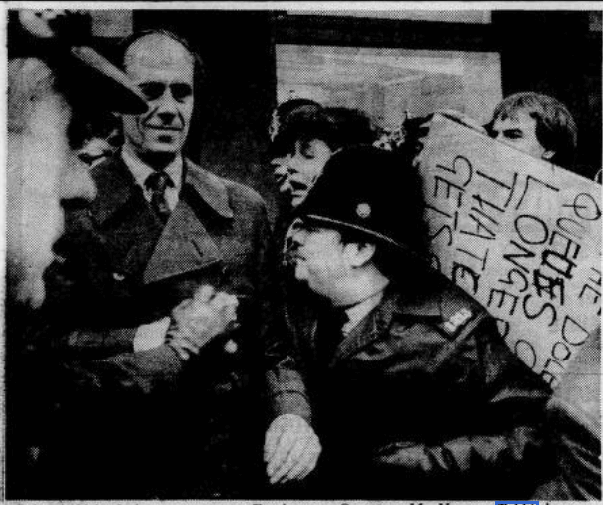
There were more protests in Leicester the following day - but this time the location was Filbert Street, and the source of anger was the austerity regime at the club. Milne had successfully addressed the 'gross over-staffing'. The big wage earners had gone, with not a penny spent on replacements. And just look at the results. We were out of the Cup, and seemingly out of the promotion race. In the Mercury, the club's policy was described as 'reminiscent of Thatcher's miserly monetarism''.
That afternoon, patience finally ran out, discontent spilled over and things turned ugly.
It started twenty minutes before kick-off. Tommy English hadn't played for two months, having been dropped in November. But when the team line-ups were announced, English was back as substitute. The news was greeted with a massive chorus of boos.
Blackburn took the lead after ten minutes, then City spent 80 minutes striving in vain for an equaliser, as the atmosphere inside the ground deteriorated. The 'Jim Melrose' chant was back, followed again by calls for Jock Wallace. When English came off the bench there were more boos, but the man who bore the brunt of the criticism, reported Bill Anderson in the Mercury, was Gordon Milne.
That was it, surely. At the very moment Blackburn went ahead at Filbert Street, Robert Wilson scored for Fulham at Craven Cottage against Middlesbrough, and they too held on for 80 minutes to collect three crucial points. That left them out of sight of the chasing pack, eleven points ahead of fifth-placed Leicester in the race for the third promotion spot (for comparison, when O'Neill's side lost at home to Sheffield United in 1996, we were still just two points off a play-off place).
What could Gordon Milne do now?
What he did was hold his nerve, and trust his judgement.
With no cash in the kitty, he knew that if he wanted a new face it would have to be a loan signing. The man he had his eye on was another Sky Blue - midfielder Gerry Daly, the stylish Irish international who'd made his name at Old Trafford. But how would the fans react? After the disastrous moves for Tommy English and Jimmy Holmes, surely a third ex-Coventry man was too much to stomach.
But three days after the Blackburn defeat, Daly arrived on a one-month loan deal. Milne said: There may be some reaction because I have taken another Coventry player, but I don’t care about that. All that matters is that this move is for the benefit of Leicester City.
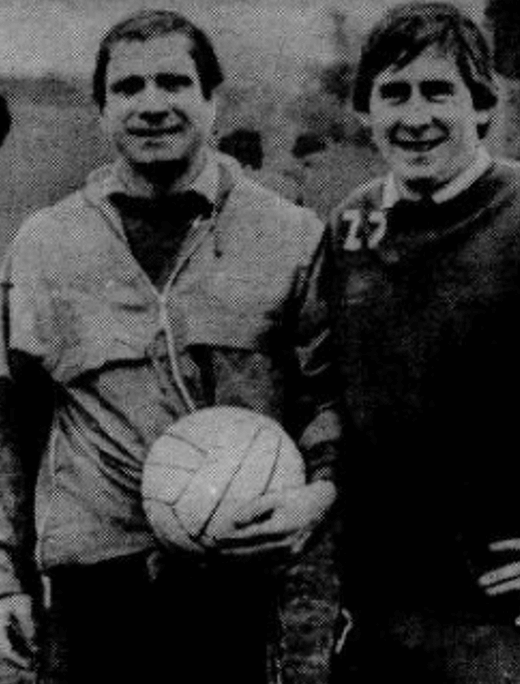
That's club captain Eddie Kelly on the left, welcoming Daly to the club at the Belvoir Drive training ground. Kelly didn't know it but he had already played his last game for Leicester. Daly was the man who took his place.
It was here, at the low point of the season, that hope was kept alive by the precedent set the previous season. Strangely enough, the man who set that precedent was none other than Martin O'Neill, the man who, a decade later, would follow Milne's blueprint and snatch promotion from the jaws of adversity. In February 1982, Norwich City had been even further off the pace in the promotion race, but when O'Neill joined from Man City, he inspired a thrilling surge that saw them clinch promotion on the final day. That was the first season of three points for a win, and teams now realised that if you could put a run together you could shoot up the table. If Norwich could do it, Milne thought, so can we.
We're Not Nervous
Gerry Daly's impact was instantaneous. We won 1-0 at Carlisle, though Fulham won too. The following week, with Larry May sent off at Grimsby, we fell to another defeat, and were now twelve behind Fulham.
Then on February 26th it all suddenly clicked against leaders Wolves. With Daly starring in midfield, and English finally finding a role on the left of midfield, we put on a show that rivaled Fulham's win at Newcastle as the Division Two performance of the season:
Fulham's return game against Newcastle was the same day, and they dropped two points in a 2-2 draw. The gap was now 10 points.
The following week Milne received confirmation of his pending court appearance on a drink-driving charge, but if he was worried about that, he didn't let it show. We kept picking up points and Fulham started dropping them - losing at Oldham and then Cambridge on a night when a crucial late header from John O'Neill gave us a 1-0 win over Middlesbrough (the electrifying effect of that moment was similar to Kevin Russell's late winner against Tranmere in 1992). After the game, O'Neill said he'd heard Macdonald on TV at the weekend claiming Leicester had no chance of catching them. But now we were just two behind, though we'd played a game more.
Once more Macdonald tried to shrug it off, saying 'Leicester have to go to QPR next so we'll be five ahead again'. Rangers were vying with Wolves for the title and seemed invincible on the plastic pitch at Loftus Road, but two Lineker goals gave us a 2-2 draw, and though Fulham beat Charlton, the gap was not five, but four. Macdonald's comments were becoming a factor in the psychological battle. Every week he had to fill those column inches in the Daily Mirror, and you know what they say - 'give 'em enough rope...' He was also providing the Mirror with numerous 'wacky' photo opportunities, such as this, which had appeared on Christmas Eve:
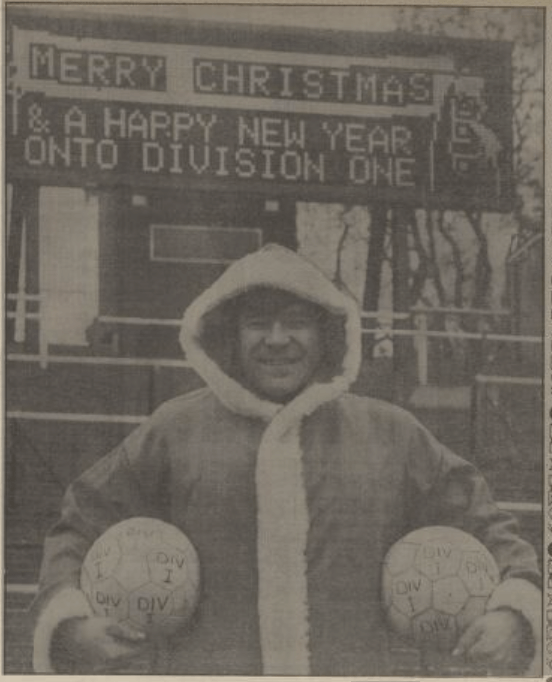
It was certainly a Christmas present - an absolute gift, just asking to be pinned on a rival team's dressing room wall and used as a dart board.
While Gordon Milne retained a steely determination, saying exactly the right thing at every stage of the run-in, Macdonald's pronouncements were becoming a liability. Asked again about the pressure of Leicester chasing them, he said, 'People are trying to create something that isn't there. We are not nervous'.
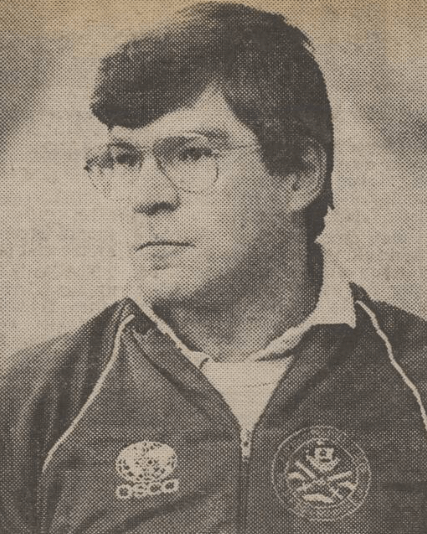
Macdoanld pictured in April as the pressure builds up.
On April 16th, with Daly's loan extended to the end of the season, Lineker got two more in a 3-1 home win over Rotherham - that was nine in ten games for him. At Elland Road that day a young striker called Tommy Wright scored to deprive Fulham of victory, and the gap was back to two, though we had still played a game more. In midweek, Fulham won their game in hand against Barnsley to go five clear with five to play. We knew we needed a result the following Saturday - at Craven Cottage.
In the recent thread about the 1991/92 season (let's call it retrospectively The Promotion Files #1), you might recall mention of the Charlton away game being 'our biggest ever away following for a League game in London'. Well, it wasn't by much - we'd taken similar numbers to the Orient title decider in 1980 - and to Fulham for this game on April 23rd 1983.
These wonderful extended highlights of the game (uploaded only a few months ago) show just how dominant we were that day. If you don't have time to watch the whole 20 minutes, head for 13.30 in the video to see the key moment:
One thing I love about that footage is the Milne interview after the game. There's one key line; in fact, one key word:
'Inevitably, one of them's going to crack'.
There it is. That single word encapsulates the whole three-month period of hunting them down and reeling them in, and reveals the ruthless streak in Milne's character that underpinned it.
He explained after that game how the team had evolved: Larry May got himself suspended and Kevin Macdonald (switched from midfield) brought a new dimension to the defence. Gerry Daly arrived and so Tommy English moved across to the left side.
That led to this classic line-up:
Mark Wallington
Paul Ramsey
John O'Neill
Kevin Macdonald
Bobby Smith (switched to left back in January after Friar / Williams / Brown has been tried)
Ian Wilson
Gerry Daly
Tommy English
Steve Lynex
Alan Smith
Gary Lineker
I Fought The Law - And I Won
A week later at Hinckley Magistrates Court, Milne finally had the opportunity to give his version of what happened late at night on January 6th. It wasn't alcohol that had caused the crash. He'd had an emotional day, with the Tommy Williams injury, and a momentary lapse of concentration on an icy road led to him losing control of his Mercedes. He was asked about the result of the blood test, which had revealed over twice the legal amount of alcohol. Supported by his wife Edith's evidence, he explained how, when he finally made it back to his Burbage home, she realised how shaken he was and gave him a glass of brandy. He'd then had several glasses more. What about the champagne he'd taken to Williams' house earlier that evening? He'd only had one glass. When he drove home, he was sober.
The prosecution tried to prove otherwise, but they couldn't. The magistrates dismissed the case.
Milne was perhaps fortunate that he wasn't working in the age of social media. You can imagine what would happen nowadays. He was no doubt thankful too that the media in Leicester played down the whole episode from start to finish. The Mercury could hardly be accused of sensationalistic journalism - on the day of the trial, their rather dry headline was 'Case Against City Manager Dismissed', above a brief report buried at the bottom of page one, almost asking to be ignored.
A different editor might have considered it a more important news item - worthy of the top story perhaps, with a punchier headline in large type, and a fuller account of proceedings, accompanied by a photo of the accused arriving at the court.
Just like this:
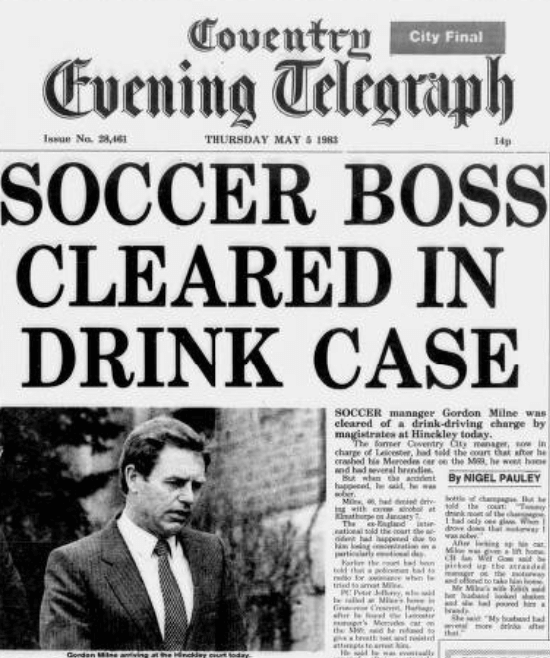
Milne left court that Thursday an innocent man. But like four months earlier following the original arrest, he now had a big decision to make about the crucial game on Saturday. Gary Lineker was injured, and would miss the last two games. Who would Milne choose to replace him at Oldham? Back in January he'd made that surprise decision to include young Paul Brown, which had backfired. Now he made an equally bold choice, bringing in Robert Jones for his debut. 'I know it's a huge risk but I must back my judgement', he said.
I don't know what's more impressive here, the action on the pitch or the scenes behind the goal:
Milne once again staying cool there after the game.
The following week was just as he predicted - Burnley were hard to beat, but the point was enough to take us up, with Fulham losing at Derby. There'll be more detail about events that day below, but the key thing was - we'd done it. A monumental achievement for a young squad, and most of all for the man who'd come through the hard times to taste glory at the finish.
This was the magnificent 15 game unbeaten run from February to the end of the season:
That's from wikipedia. You'll notice Robert Jones' name is in a different colour. Yes - the man who played such a key role in the climax to that historic season does not have a wikipedia page.
At season's end came this wonderful tribute from David Welch, Sports Editor of the Mercury (a man about whom I know nothing, though I wish it were otherwise - this is one of the best things I've ever read in that paper):
It's time soccer managers took a back seat. Last weekend we were confronted with pictures of one Cup Final manager, Brighton's Jimmy Melia, surrounded by models in lingerie, and another, Ron Atkinson of Manchester United, perched on the bonnet of a sports car. I had an overwhelming feeling that we should be seeing players, not managers, in those situations. Managers in the past didn't need to have the spotlight turned on them like today's 'larger-than-life' brigade.
Every so often, however, a manager overcomes the odds to such an extent that he deserves every bit of praise and publicity he receives. So much more so, of course, if he seeks neither. And that, I believe, is the situation this year with Leicester City and Gordon Milne.
Set against a backcloth of severe financial restrictions, necessary team pruning, and falling attendances, Milne has produced a team which has proved capable of gaining promotion.
He came in, almost apologetically, to replace the more brash and exuberant Jock Wallace, and quickly had to withstand criticism from loyal Wallace fans during a disappointing start to the season when he seemed more concerned with cutting the wage-bill (and his own resources) by transferring Wallace's costliest buys.
Admirably resisting the temptation to hit back, Milne won over the players, and with a quiet confidence, began rebuilding a side not exactly full of heart after the shock, and demoralising exit of Wallace last summer.
The side soon played its part by displaying magnificent team spirit and commitment but, whereas his predecessor often found that the quality to be most admired, Milne himself appeared, rightly, to take it for granted. Commitment is the very least supporters can expect of a team, and that's largely what enabled them to gradually reduce Fulham's lead in the promotion race.
That, allied to no small amount of skill, has taken the side back where they belong.
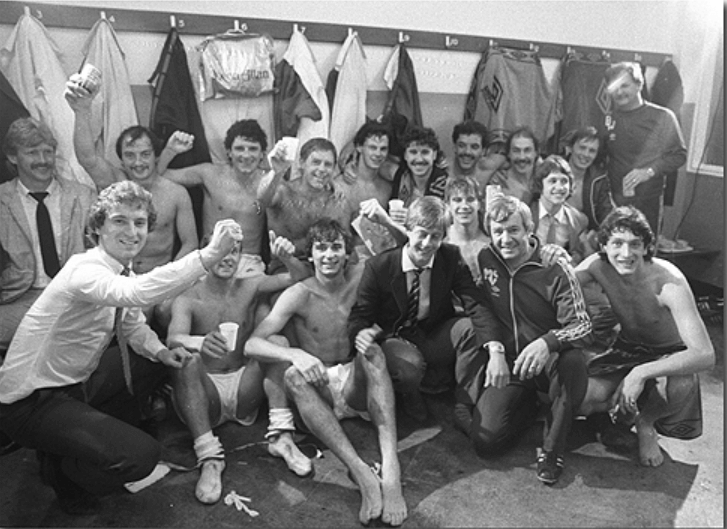


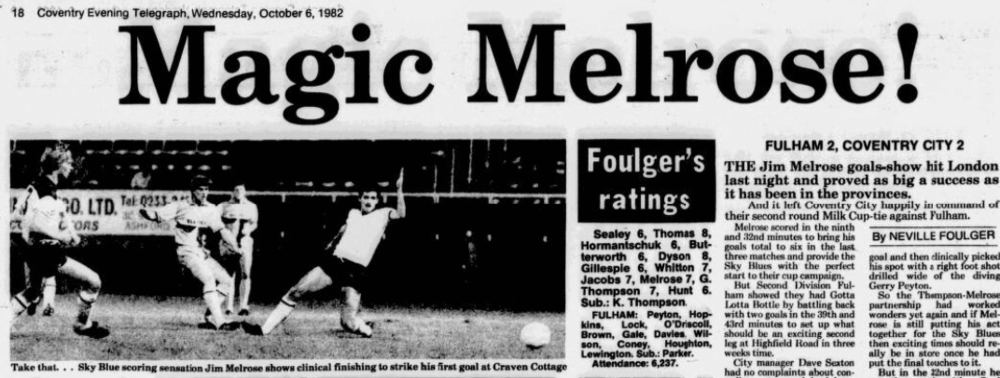
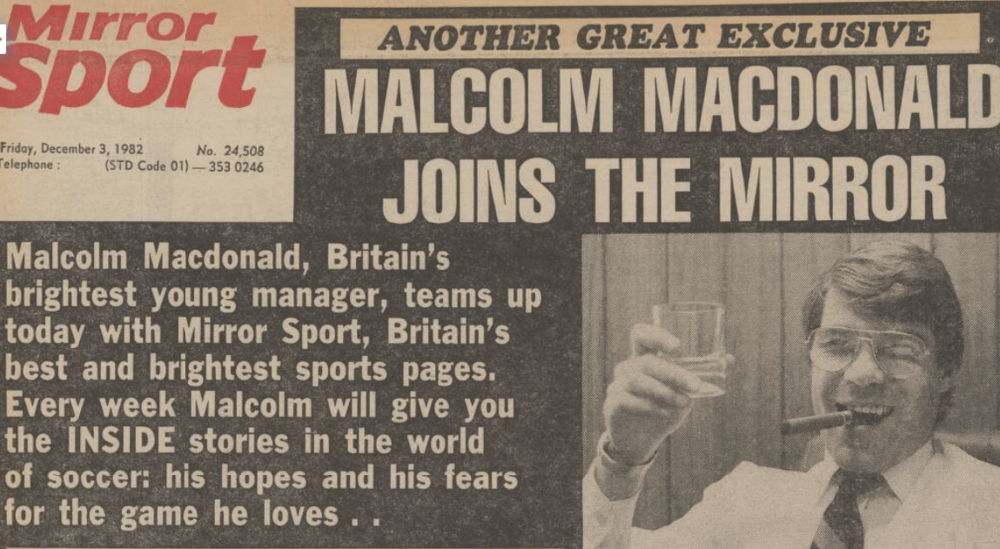

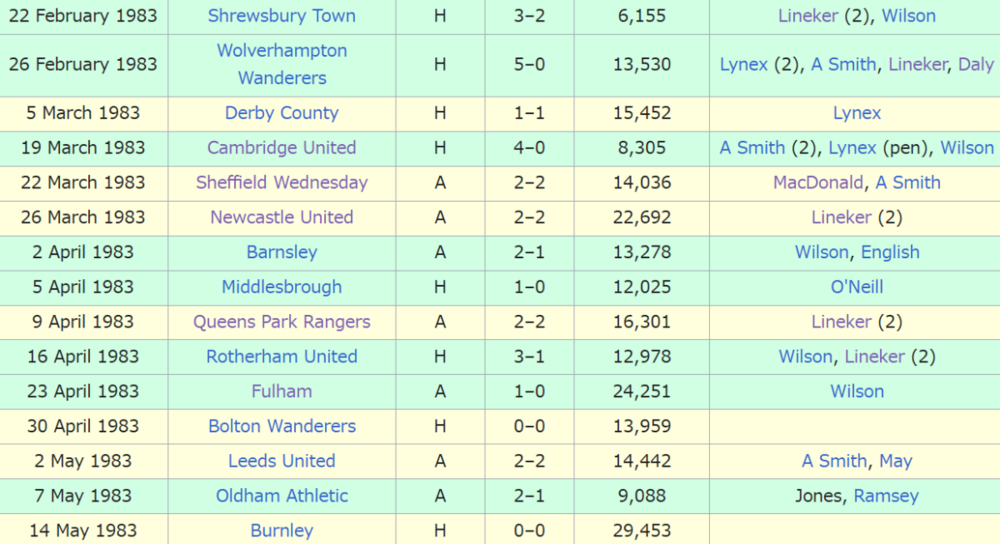
Recommended Comments
Join the conversation
You can post now and register later. If you have an account, sign in now to post with your account.
Note: Your post will require moderator approval before it will be visible.